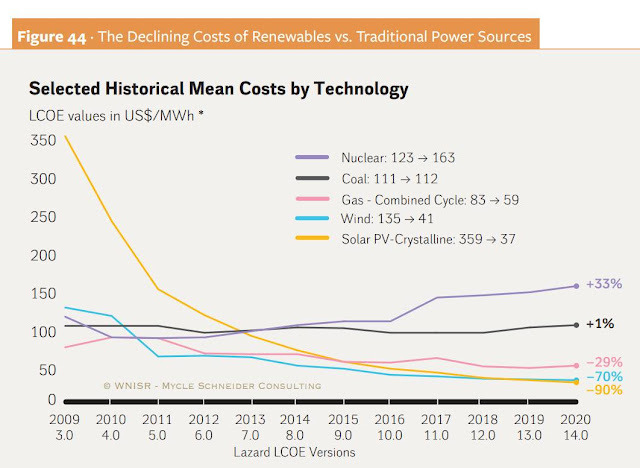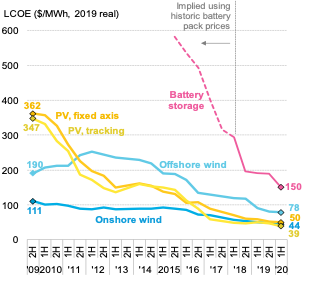Do you remember that old prediction saying that nuclear technology would bring us energy "too cheap to meter?" It was said about nuclear fusion in a 1954 speech by the then-Chairman of the Atomic Energy Commission, Lewis L. Strauss. Over the years, it was widely mocked and taken as an example of technological over-optimism. It was the opposite of the predictions of the 1972 report "The Limits to Growth," ridiculed for being too pessimistic.
Well, it seems that more than one prediction that went out of fashion is being revised and reconsidered. For one thing, the limits to growth are being reached right now (and peak oil, too!), but at the same time, the idea of "energy too cheap to meter" is becoming true -- with just one small change: the nuclear plant that will produce it is not located on Earth, but safely kept at some 150 million km from here.
We call this energy "renewable" when we collect it using photovoltaic technologies (or, indirectly, using wind plants). Strictly speaking, it is not renewable: it will be available at most for a few billion years in the future. Nevertheless, that should be a time span long enough for most of us. For the time being, we can call it "Space Fusion Power." It is power from nuclear fusion, it comes from space, so, why not?
Space Fusion Power is not yet too cheap to meter, but surely very cheap, and heading in that direction.
Look at this table:
Image from "World Nuclear Report" -- the data are updated to 2020. Today, with the cost of natural gas increased of a factor of about 10, there is no comparison anymore. Renewables beat everything else in terms of cost. Yet, plenty of people still haven't realized how the rules of the game are changed and still reason on the basis of the situation of 10 years ago. A few, though, are starting to open their eyes to the new reality. History is on the side of renewables and they will forever bury fossil fuels (and nuclear, too).
But we need too much space for the solar light collectors, don't we? Oh, yeah? Take a look at this image from a recent article by Jacobson et al.
So, we have to get used to the idea that renewables are cheap. Very cheap. So cheap that they may soon become "too cheap to meter." The idea is slowly diffusing in the collective Western consciousness, despite the social Alzheimer's syndrome that seems to be affecting everyone, everywhere. But, once it penetrates the cerebral cortex, some people are even able to reason about it! If renewables have become 10 times cheaper than any other kind of power generation technology, the consequence is:..... Ah....
All our problems are solved, then? Well, no.... In a complex system (and we are living in one), there are no such things as problems and solutions. There are only potentials and feedbacks. More simply: in a complex system, there is always change. You may like the change or not, but that's how things are: the system couldn't care less about what we humans think are "problems." It will change when and if it decides to do so.
And things are going to change. Things are going to change a lot. Things are going to change much more than you can imagine.How are they going to change? What kind of world will be one where we have abundant and nearly free energy from space? Good question. We'll have to see....
To know more on this subject, see these papers
https://rethinkdisruption.com/next-economy-growth-degrowth/
http://web.stanford.edu/group/efmh/jacobson/Articles/I/145Country/22-145Countries.pdf





No comments:
Post a Comment